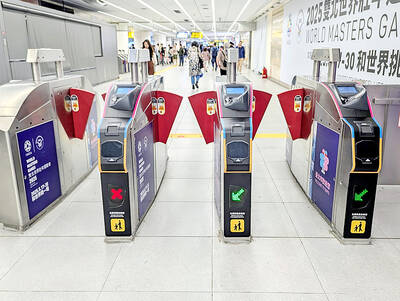Listening to Mozart’s piano concertos for eight minutes a day can reduce the frequency of seizures in young epilepsy patients by 30 percent, a study carried out by Kaohsiung Medical University (KMU) showed.
The study, conducted in collaboration with researchers at National Sun Yat-sen University’s department of music, examined the effects of Mozart’s music on children 17 years old and under who suffer from epilepsy.
Lin Lung-chang (林龍昌), a child neurologist at KMU Hospital and a member of the research team, said brain wave tests on 58 epilepsy patients in the designated age group showed that the frequency of abnormally excited electrical signals in the brain dropped an average of 30 percent in 47 cases after listening to eight minutes of Mozart’s piano concerto K448.
In a second-phase test over a longer period, it was found that the longer the program of music therapy lasted, the better its healing effects on the patients.
“Six months would be the best time span for music therapy,” Lin said.
In a third-phase test, 18 patients with a high frequency of seizures or convulsions were found to have experienced a whopping 53 percent reduction in frequency after a long period of music therapy, Lin said.
Yang Jui-cheng (楊瑞成), another team member and child neurology expert at KMU Hospital, said the study found that in addition to “markedly improving” epilepsy in children, music can also help to reduce the dosage of medication patients require and its side effects.
He said that foreign studies have demonstrated that music can help cure Parkinson’s disease, dementia, strokes, sleeping disorders and attention deficient disorder, and has a good record of improving patients’ quality of life.
In 1993, a medical journal reported that college students who took an IQ test after listening to Mozart’s piano concerto K448 scored eight or nine points higher than usual, Lin said.
The research conducted by Lin’s team will be published in Epilepsy Research, a well-known medical journal.

A magnitude 6.4 earthquake struck off the coast of Hualien County in eastern Taiwan at 7pm yesterday, the Central Weather Administration (CWA) said. The epicenter of the temblor was at sea, about 69.9km south of Hualien County Hall, at a depth of 30.9km, it said. There were no immediate reports of damage resulting from the quake. The earthquake’s intensity, which gauges the actual effect of a temblor, was highest in Taitung County’s Changbin Township (長濱), where it measured 5 on Taiwan’s seven-tier intensity scale. The quake also measured an intensity of 4 in Hualien, Nantou, Chiayi, Yunlin, Changhua and Miaoli counties, as well as

Credit departments of farmers’ and fishers’ associations blocked a total of more than NT$180 million (US$6.01 million) from being lost to scams last year, National Police Agency (NPA) data showed. The Agricultural Finance Agency (AFA) said last week that staff of farmers’ and fishers’ associations’ credit departments are required to implement fraud prevention measures when they serve clients at the counter. They would ask clients about personal financial management activities whenever they suspect there might be a fraud situation, and would immediately report the incident to local authorities, which would send police officers to the site to help, it said. NPA data showed

ENERGY RESILIENCE: Although Alaska is open for investments, Taiwan is sourcing its gas from the Middle East, and the sea routes carry risks, Ho Cheng-hui said US government officials’ high-profile reception of a Taiwanese representative at the Alaska Sustainable Energy Conference indicated the emergence of an Indo-Pacific energy resilience alliance, an academic said. Presidential Office Secretary-General Pan Men-an (潘孟安) attended the conference in Alaska on Thursday last week at the invitation of the US government. Pan visited oil and gas facilities with senior US officials, including US Secretary of the Interior Doug Burgum, US Secretary of Energy Chris Wright, Alaska Governor Mike Dunleavy and US Senator Daniel Sullivan. Pan attending the conference on behalf of President William Lai (賴清德) shows a significant elevation in diplomatic representation,

The Taipei MRT is to begin accepting mobile payment services in the fall, Taipei Rapid Transit Corp said on Saturday. When the company finishes the installation of new payment units at ticketing gates in October, MRT passengers can use credit cards, Apple Pay, Google Pay and Samsung Pay, the operator said. In addition, the MRT would also provide QR payment codes — which would be compatible with Line Pay, Jkopay, iPass Money, PXPay Plus, EasyWallet, iCash Pay, Taiwan Pay and Taishin Pay — to access the railway system. Currently, passengers can access the Taipei MRT by buying a single-journey token or using EasyCard,